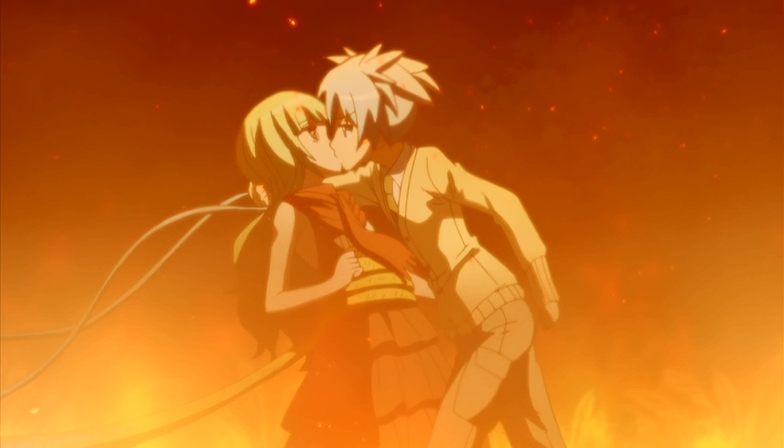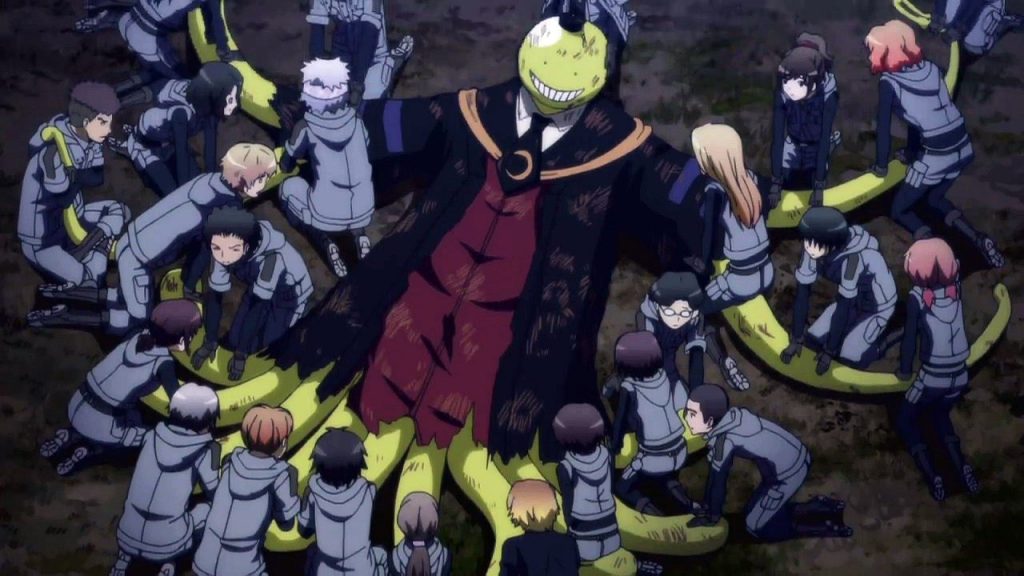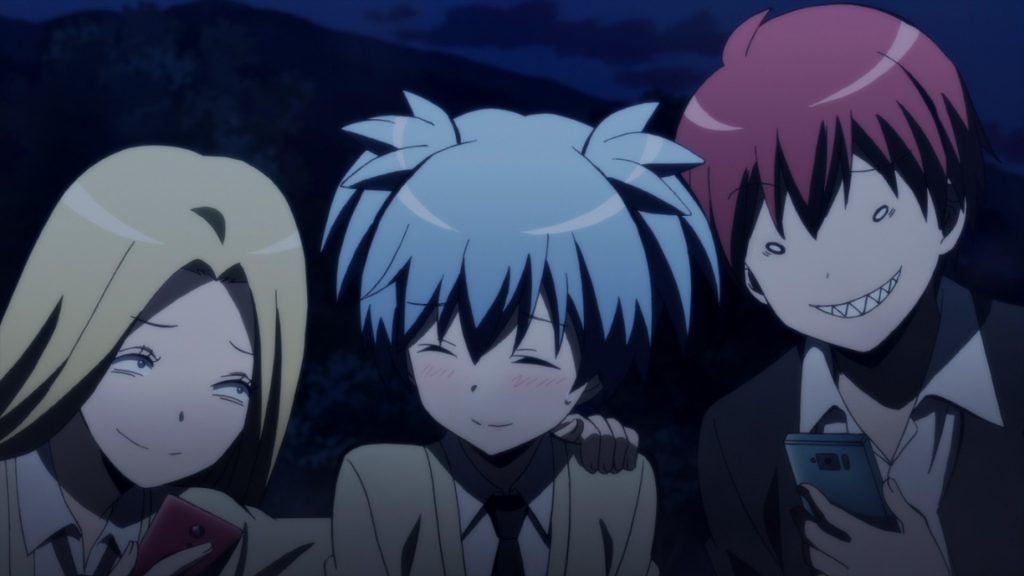Those who have followed the Assassination Classroom saga finally get what they wanted. Questions that fans ask as the show progresses are finally answered, which makes staying invested easy. What is Koro-sensei’s past? What will Nagisa do with the undeniable talent he has as an assassin? Plus, a lot of other cool things occur in this set to give fans of the series a proper ending. For a series that goes past the typical 12 episodes, there needs to be mysteries to keep fans interested. Assassination Classroom does this well, but is the series all that it’s cracked up to be, considering how widely popular it was when it was first running (in both anime form and Weekly Shonen Jump)?
The aspect that puts Assassination Classroom in a “class” of its own is that this anime ends the way the manga did. Very rarely do fans get an anime that follows the manga, and Assassination Classroom gives us a rare treat in ending how it was supposed to end. I didn’t think that this was even possible, because I’ve rarely experienced anything like this. Usually, an anime doesn’t finish when the manga does, leaving the anime to go in a different direction. That will automatically give this series more points with me, just for the rarity of something like this happening. It ended the way the author intended. Instead of having a situation you usually get (something like Fruits Basket and Vampire Knight come to mind), you get a proper sendoff to a series that I felt did a lot to ingratiate itself within the anime community.
I always gush over the message that Assassination Classroom tries to convey, and it doesn’t change in this last installment of episodes. Teaching young minds to use the talent and abilities they have responsibly, is a great lesson for younger fans, especially if you are talented at something and believe you don’t have to work hard to achieve greatness. For example, if learning comes naturally to you, it’s good to continue to grow and study to be even better. Take nothing for granted and continue to work hard and you’ll reach higher peaks. It’s the very essence of what Assassination Classroom teaches its viewers (and a message that I think should be shown to many young students today). For me, that type of clear message (as well as others, like persevering to reach a challenging goal) are things that made watching Assassination Classroom enjoyable.
So what made this assortment of episodes such a fun watch? The fact that two of my favorite story arcs from the manga were animated in this last installment. First, we learn about Kayano’s backstory and how she’s connected to Koro-sensei. She was also implemented with tentacle weapons (like Itona in the first season) to try and kill the unkillable teacher. However, Kayano was driven by deep-seated revenge, believing that Koro-sensei killed her older sister. Koro-sensei and Kayano’s sister Auguri have a history together from before Koro-sensei became the tentacle monster that he is today. Thanks to Nagisa’s quick wits and her planting a kiss on Kayano to subdue her, we get to find out more about Koro-sensei’s past. Afterwards, we finally learn how Koro-sensei became what he is now.
Koro-sensei explains how he was an unparalleled assassin before his transformation. He later takes on an apprentice (who we know as the new “Reaper”), who then sets up Koro-sensei to be captured by a research facility. This facility was trying to develop a biometric weapon that they could implant into to people (which would later become tentacles). That was where Koro-sensei, Shiro, and Aguri all met. Koro-sensei withstood the abuse of being a test subject for Shiro, who did not care if Koro-sensei lived or not. Aguri was there to help Koro-sensei feel at ease and to see if the experiments would mess with him. The two develop feelings for each other as they spend time together. It is there where Koro-sensei learns that Aguri was a teacher for E-Class at Kunugigaoka Junior High School. Koro-sensei, getting tired of being at the research facility, decides to escape and kill everyone there. However, he’s nearly killed by a trap that Shiro sets up, and instead is saved by Aguri, who dies in his place. Thus, begins the series where Koro-sensei decides to teach E-Class, the place Aguri loved so much.
After learning about Koro-sensei’s past, the classroom feels split on what to do. Should they kill him after suffering from experiments he faced or finish what they were asked to by the government. This question leads to a “civil war” where the students break out into two teams (lead by Nagisa and Karma) to decide what to do with Koro-sensei. This leads to an epic battle between the students that became my highlight of the entire release. I found this arc satisfying, seeing the students of E-Class battle it out, using all the talents they’ve learned in their assassin lessons. Watching Nagisa in action, proving he is the most skilled assassin of the class, was a thing of beauty. But watching as other students showcase their skill in this “civil war” is something that I think everyone will enjoy. It was by far, my favorite arc in the manga, and while I wish it lasted longer in the anime, it was still fantastic watching it play out. In the end, Nagisa prevailed, and so the students decided to help save Koro-sensei from exploding.
The government, as well as Shiro, make one last ditch effort to assassinate Koro-sensei, creating a specialized barrier to keep him stuck in the E-Class building. The students don’t take too kindly to it (especially all the publicity) and do what they can to free him. This leads to an epic battle between Koro-sensei, Shiro, and The Reaper, who are also genetically enhanced like Koro-sensei. The struggle becomes something you’d expect from Dragon Ball Z, and it ends with Koro-sensei winning at the significant cost of losing nearly all of his energy. It leads to the students of E-Class all jumping on top of him and Nagisa delivering the killing blow on his beloved teacher.
I was surprised that Yūsei Matsui (the author) decided to go with this ending. I wasn’t expecting Koro-sensei to die after all that’s happened. He is such an excellent teacher and was able to inspire a class that had little faith in the upstanding students they are now. So once Nagisa won the “civil war” against Karma, I thought for sure that they’d either find a cure or just keep Koro-sensei alive. To instead turn it all around and have the one who wanted to save him the most kill him is pretty depressing. I didn’t like the fact that Koro-sensei had to die, considering how much he contributed to his students and, eventually, society. You still, however, get to see Koro-sensei’s influence since fans are given an epilogue episode to show what transpired after the assassination of Koro-sensei. Not only was it refreshing to hear what the students did with the reward money (donating it and giving it back to the government), but the manner in which the students eventually grew up into adults felt great. I’m a sucker for that type of final episode, so seeing E-Class older was something I couldn’t have been happier to watch (especially seeing what they do for a living). It made things even better hearing that the former E-Class students bought the land where their old school was (since it was shut down for good).
Still, Assassination Classroom, in all of its glory, did do some things that didn’t sit well with me. The first being how long the final moments of Koro-sensei were drawn out. It was way too long and drove me insane. I just wanted to get it over with if Nagisa was going to kill him or not. Instead, Koro-sensei does a roll call that felt like it took half the episode to complete. As if that wasn’t enough, the crying in that episode was nails on a chalkboard, I couldn’t listen to it. It wasn’t as if I thought the acting was terrible. To me, it destroyed the emotional appeal. It might have been a better choice to have some sad music and simply see the students cry instead of hearing them, or to just have no sound at all as you see the students cry. That’s something that has been hit or miss with Assassination Classroom. There have been times where the series had sound that I felt was unnecessary. The best example I can recall is when Nagisa first took down their former teacher Takaoda with a real knife. We hear him talk through the whole process which diminished the dramatic effect of Nagisa one-upping the professional assassin. I think it’d been better if it was silent through that entire encounter. It’s the same issue in the climactic scene.
And what increased my aggravation during the death of Koro-sensei was how quick the other arcs went. I’d love if there were more time spent into Kayano’s betrayal and the “civil war.” Both took two episodes each, and I think it could have easily been longer (or at least the “civil war” arc). For the “civil war” in one episode, we see Karma’s team clean house until Nagisa evens the score. I think that arc could’ve been drawn out more to give background characters more of a chance to shine. Sure, that would have given us more of watching Karma’s team clean house, but I’d rather have that showcased for an extended period rather than having it finish in one episode (until Nagisa gets a quadruple kill). Instead, it was just reinforced that Nagisa and Karma are two of the cooler characters, which we already knew. I’d like to have seen others get a chance to prove their merit. Which was something that Assassination Classroom did pretty well. Sure a few students could have used a little more screen time, but I felt overall that each student had some special moments. So with how short these arcs felt, it frustrated me.
I don’t normally like to nitpick when it comes to who was cast as who, but for this series, after watching it entirely, I don’t think Chris Ryan was the right voice for Mr. Kurasama. To me he came off as too monotone, although I get that his character is an assassin. So it’s not as if he should have a ton of emotion in his performance. I believe he was directed to be more reserved, but instead of coming off that way, at times it just felt like he was simply reading his lines especially at times when more emotion was called for (in my eyes). It didn’t detract my overall enjoyment from the show as that’s the only voice that I took issue with as a whole. I found the cast of Assassination Classroom to be one of FUNimation’s best when you look through all the actors in the series. Sony Strait delivers one of his best performances as Koro-sensei, as he always seems to be able to match the craziness as well as his more serious moments. It is one of his best roles to date. Austin Tindle shined as Karma throughout, being able to match the maniacal tone that Karma displays in the series. And Lindsay Seidel, chosen for Nagisa, is about as perfect as you’d expect. It seemed like everyone became more and more comfortable with their roles and it was noticeable, but those three were easily the ones who stood out the most.
The extras in this release were minimal, compared to what has been included before. There was a top-ten moments of Assassination Classroom video, but it didn’t feature any of the cast’s opinion. It was just a generic countdown video. I thought there’d be more in this release, considering it’s the last one.
Overall, I found this series to be enjoyable. The interpretation of the school system is fascinating and something that I think people should be wary of. It’s great to take studies seriously, but without any fun it can make learning a pain or chore. Of course, when you have the resources and talent to be an excellent student you should use them instead of not doing anything about it. Koro-sensei is a fantastic character that can inspire many of us to be better, and that’s something I’ve felt since watching Assassination Classroom. I find it to be a great series that many people will enjoy and one that I’d even recommend to those who don’t watch anime often. I’m sad that this series is over, and that it couldn’t have lasted just a little longer. But that’s an indication that overall, this series was fantastic.
Rating:
9/10
Pros: Two of the best arcs got a chance to shine; watching the “civil war” unfold; having the same ending as the manga; having an epilogue episode; overall solid English dub.
Cons; Long drawn-out ending when Koro-sensei was killed; rushed through favorite arcs; few extras in release.
C.J Maffris is an editorial writer for toonamifaithful.com and GeekEInc.com. Feel free to follow C.J on Twitter @SeaJayMaffris






